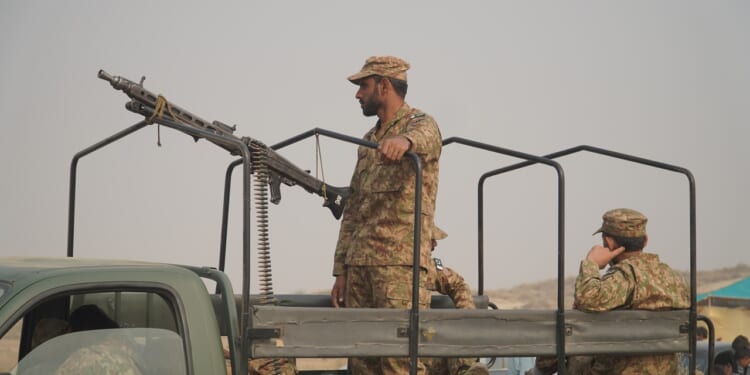Pakistan and Taliban-controlled Afghanistan have been unable to reach an accommodation over their border dispute for a simple reason: each of them has zero trust in the other.
Just when you thought the conflict between Afghanistan and Pakistan had been resolved due to President Donald Trump’s intervention at the diplomatic level, the two sides threw a curveball at observers. While delegates representing the two warring neighbors met in Istanbul, Turkey—with Turkish and Qatari officials mediating—the four-day meeting failed to achieve a negotiated settlement. Pakistan’s information minister has stated that his government does not believe there is a “workable solution” to the conflict.
The ceasefire that paused hostilities between the two warring parties was brokered on October 19, after deadly clashes along their border left dozens of people dead. The Istanbul talks were meant to convert the ceasefire into a longer-term truce, or to at least create mechanisms to limit violence. It appears to have failed at both objectives.
Pakistan and the Taliban Don’t Trust Each Other Enough to Negotiate
Pakistan has repeatedly accused Afghanistan’s ruling Taliban regime of allowing—or at least not doing enough to prevent—members of the Tehrik-e-Taliban Pakistan (TTP) from operating out of Afghan territory and attacking Pakistan. From the Pakistani view, the Afghan delegation was reluctant to make concrete commitments on controlling or eliminating the TTP’s sanctuaries. A Pakistani source told Al-Monitor that the Afghan side “had no control over the TTP.”
Kabul, on the other hand, insists that it does not harbor militants who are targeting Pakistan, and that cross-border attacks are not always under its direct control.
One catalyst for the clashes was alleged Pakistani airstrikes inside Afghanistan, and questions about drone operations—Pakistan admitted to agreements with the US that involved drone operations, which agitated the Afghan side. Afghanistan raised concerns about violations of its sovereignty and demanded guarantees. Pakistan, of course, pushed back, saying that it would protect itself.
New Variations on an Old Border Complaint
The border between Pakistan and Afghanistan (the so-called Durand Line) is deeply contentious. It was drawn in 1893 by a British official to separate India, then controlled by the British Empire, from the independent Afghanistan. The border effectively cut in two the lands of the Pashtun ethnic group, relegating them to minority status in both countries. The Pashtuns, who make up the backbone of the Taliban, have long opposed the border and sought to extend it further into Pakistan.
Afghanistan’s Pashtun-dominated Taliban government has never formally accepted that line as the permanent border, complicating any long-term settlement with Pakistan. Pakistan, meanwhile, wants assurances that Afghan territory will not be used to stage attacks into Pakistan. But Afghanistan sees broader structural issues as an impediment to any deal—including border definitions and overall relations with Pakistan.
Pakistan accused the Afghan core of deviating from the “core issue” and resorting to “blame game, deflection ruses.” Afghan Taliban officials, in turn, said Pakistan was presenting unclear demands and changing its position.
Essentially, both sides entered the talks with very different expectations and little common ground for compromise. It was pressure from the American side that brought the two parties to the negotiating table. Ultimately, it will likely take further buy-in from the Americans.
Given the deep mistrust, the Afghan side was unwilling at Istanbul (or unable) to accept Pakistan’s key demand (which was taking decisive action against TTP bases inside Afghanistan) in a way that Pakistan deemed acceptable. That just goes to show how malicious the Taliban’s intentions are.
What’s more, it gives credence to the claims from people in the United States—such as former CIA officer Sarah Adams—who insist that the Taliban in Afghanistan are giving succor to al-Qaeda and other jihadist groups who are planning to launch terrorist attacks here in the United States.
Pakistan annihilated the Taliban targets in the early phase of the war. Why would the Taliban not seek to make amends with the Pakistanis—especially considering how Pakistani intelligence have long nurtured and supported the Taliban (as a strategic lever to use against their longtime foes in India)?
Meanwhile, Afghanistan felt that Pakistan was ignoring their sovereignty concerns and came with demands that did not match what Kabul was willing to deliver.
Terror, Trade, and Trump
The Washington Post reports that the ceasefire holds, at least for now. The long-term truce is off the table unless something drastic changes. Pakistan’s defense minister warned that failure to reach a deal might restart hostilities.
Border crossings remain disrupted, as has trade. The humanitarian impact for border communities is significant. Without addressing the militant sanctuaries, the border dispute, and the sovereignty concerns, future clashes are likely.
These relations matter not just bilaterally, but regionally. A relapse into heavy armed conflict between Afghanistan and Pakistan could further destabilize South Asia, encourage militant groups, and undermine efforts at regional cooperation. The failure illustrates the chasm that exists between the two parties and highlights how serious of threat to its neighbors the Taliban regime is—and will become over time.
Eventually, one party (or possibly both) will seek to rope the Americans into ending this conflict, as neither the Taliban nor the current government of Pakistan can afford to be isolated from each other. Pakistan’s largest trading partner in the region is Afghanistan, although total trade with Afghanistan remains small compared to Pakistan’s other global trading partners. As for Afghanistan, Pakistan is its biggest, most reliable trading partner, now that the Americans have bailed out of Afghanistan and the Taliban are controlling things again.
They won’t negotiate in good faith—especially the Taliban, who simply cannot be relied upon to keep any deal they strike. But they can’t afford a war, either. Both parties want Trump to step in again. Trump should stay away.
About the Author: Brandon J. Weichert
Brandon J. Weichert is a senior national security editor at The National Interest. Recently, Weichert became the host of The National Security Hour on America Outloud News and iHeartRadio, where he discusses national security policy every Wednesday at 8pm Eastern. He is also a contributor at Popular Mechanics and has consulted regularly with various government institutions and private organizations on geopolitical issues. Weichert’s writings have appeared in multiple publications, including The Washington Times, National Review, The American Spectator, MSN, and the Asia Times. His books include Winning Space: How America Remains a Superpower, Biohacked: China’s Race to Control Life, and The Shadow War: Iran’s Quest for Supremacy. His newest book, A Disaster of Our Own Making: How the West Lost Ukraine is available for purchase wherever books are sold. He can be followed via Twitter @WeTheBrandon.
Image: Shutterstock / Sumblistaan.


















